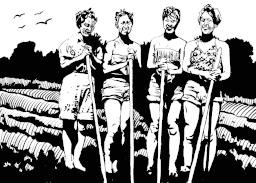
Onion Skins And Peach Fuzz: The Farmerettes At The Blyth Festival
The Blyth Festival is capping its 50th anniversary season with Onion Skins And Peach Fuzz: The Farmerettes, a vibrant and moving story of the thousands of young women who volunteered to work the fields of Ontario during the Second World War, while the farm hands went off to war.
Onion Skins And Peach Fuzz: The Farmerettes (hereinafter simply The Farmerettes) is based on a book of the same name by Bonnie Sitter and Shirleyan English, a sort of scrapbook of memories and photographs of the girls, most of them teenagers, who came to their country’s aid with the slogan “We can’t fight if we can’t eat.”
Playwright Alison Lawrence has done a masterful job of distilling the book into a bracing narrative that focuses on a small group of Farmerettes, all of them new to farm work, as they struggle and mature and form a tight-knit camaraderie.
Lawrence tells the Farmerettes’ story with a cast of just six young women, each of whom play several characters including all the men. I usually bristle at the way theaters insist on shoehorning women into men’s roles, but here the device makes perfect sense. The Farmerettes is, after all, a story about women; it should be told by women.
The Farmerettes uses a number of theatrical devices that have become increasingly familiar to me as I have seen more of the Blyth Festival’s distinct approach to telling the stories of its local community. Actors announce scenes, speak directly to the audience, read out their letters home, and even push around a “tractor” built of a bench, boxes, and tin tubs. It’s simple, direct, and it works beautifully.
While the overall tone of The Farmerettes is light and often comic, there are serious undertones. Some of the girls are dealing with insecurities, past trauma, and uncomfortable family situations.
In the second act we learn of the plight of Canada’s Japanese minority. Those living on the Pacific Coast were dispossessed of their property, interned, and then forced to move east of the Rockies lest they aid a Japanese invading force. The Farmerettes bond with their Japanese contemporaries and face down some ugly racism of the part of some locals.
The director, Severn Thompson, whose work ranges from zany collaborative comedies like Wing Night at the Boot at Blyth to G.B. Shaw’s Candida at the Shaw Festival this season, draws sharply delineated performances from her cast, who range from the very good to the exceptional.
The Farmerettes was to play on the Festival’s outdoor Harvest Stage. On the night I saw it, inclement weather forced a move to Memorial Hall and a stage half the size of the outdoor venue. With no chance to do a run-through before the show the cast responded like the troupers they are and carried the show off with elan. They even managed to turn a few glitches to their advantage, earning laughs from the audience (and suppressed giggles from their fellow actors).
I was especially taken by the performance of Lucy Hill, who shone as identical twins in last season’s Liars At A Funeral. In Act One she plays a standoffish Czech refugee with an attitude and a Marlene Dietrich vibe. In Act Two she plays everything from a crusty old farmer, to a bratty neighborhood boy, to the world’s worst cook, who’s also a nasty racist.
Charlotte Dennis does lovely job as a “rich girl” who has trouble fitting in and whose father has gone missing in Europe.
Kelly Wolf created the effective set, more elaborate than in many of Blyth’s outdoor productions, along with the period costumes that were accurate right down to the girls’ knickers. Steve Lucas, the lone male associated with this production, did a surprisingly good job of lighting the indoor version on such short notice.
Blyth’s continued success is a result of the deep bond it has formed with its audience. A few actual Farmerettes, now in their 90s, were in the audience and many others were daughters, sons, and grandchildren of Farmerettes. And when a secret code the girls devised – “Do you think the rain will hurt the rhubarb?” – got a big laugh I realized I was one of the few in the audience without an intimate knowledge of farm life.
By the way, the onion skins and peach fuzz part of the play’s cumbersome title comes from the fact that those two byproducts of harvesting are among the most irritating things a farmer has to deal with. Who knew?
Onion Skins And Peach Fuzz: The Farmerettes is a wonderfully touching tribute to a fascinating chapter in Canadian history that I gather has been shamefully overlooked. Call me a sentimental old fool, but I found tears welling in my eyes at more than one point in the proceedings. The show makes a fitting conclusion to what has been a splendid season.
Onion Skins And Peach Fuzz: The Farmerettes continues at Blyth’s Harvest Stage (weather permitting) through August 31, 2024. For more information and to purchase tickets visit the Blyth Festival website.
For a complete index of reviews CLICK HERE.
Don’t miss another review or blog post! SUBSCRIBE HERE.

